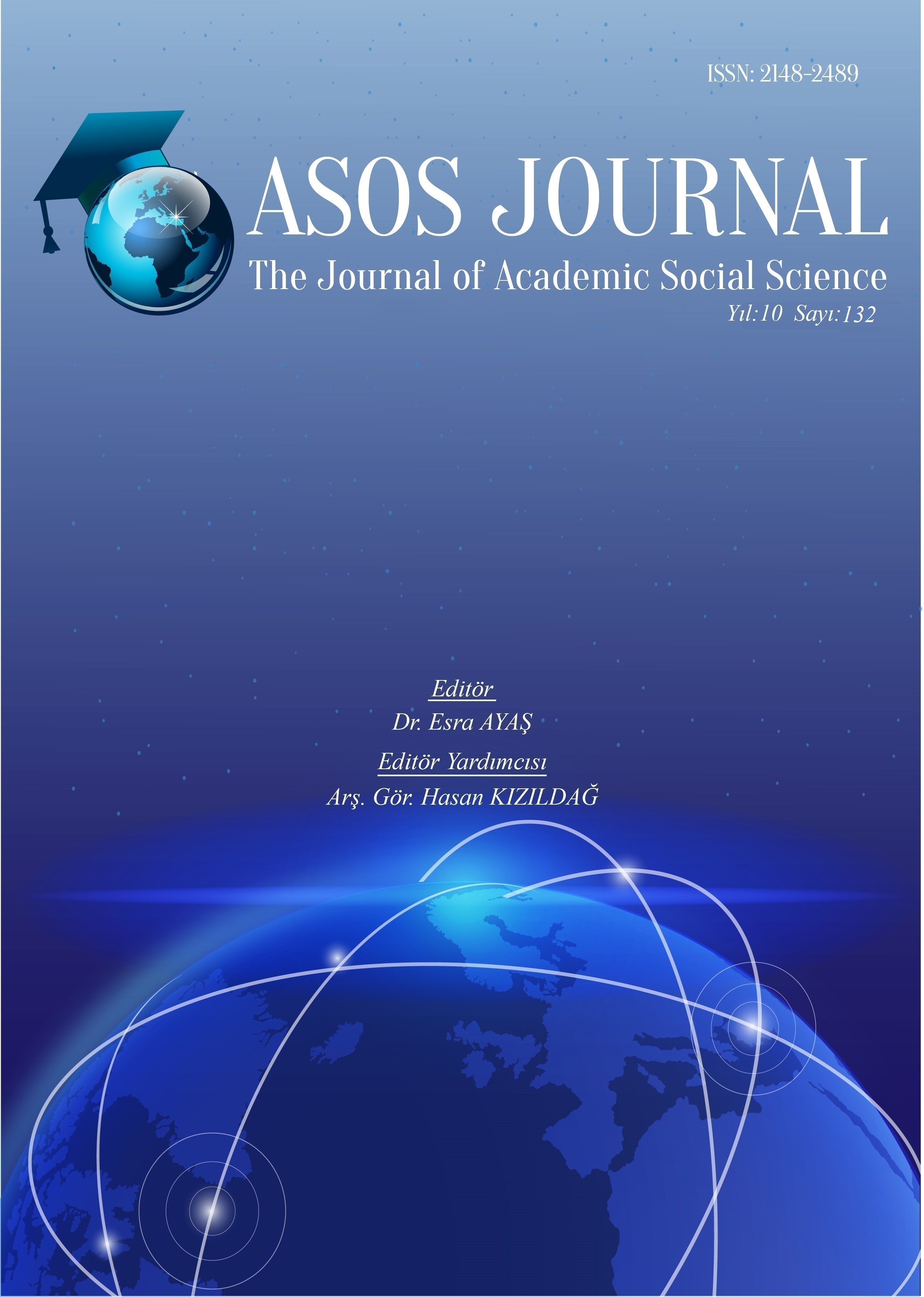Author :
Abstract
Bu eserde Türkiye’nin en tanınmış yönetmenlerinden biri olan Nuri Bilge Ceylan’ın son filmi olan Ahlat Ağacı konu edinilmiştir. Makalede, filmin hikayesi kısaca anlatıldıktan sonra, Ahlat Ağacı filmi ile bağlantılı bir şekilde olgu-kurgu ikili karşıtlığı tartışılmaktadır. Olgu ve kurgu konusundaki ilgili, sinema ve kurgusal diğer eserler ile bağlantılı tartışmalar kuramsal bazda izlenerek, filmin, kurgusal karakterine rağmen bazı olguları yansıttığına hatta bazen direkt olarak verdiğine vurgu yapılmaktadır. Aynı zamanda makalede, konunun sosyo-felsefi yönlerine, karakterlerin analizi yoluyla da değinilmektedir. Ahlat Ağacı’nda, Nuri Bilge Ceylan’ın, insanı merkeze alarak, günümüz Türkiye’sindeki en önemli ve acilen ele alınması gereken, işsizlik, sosyal dışlanma ve toplumsal ayrışmalar gibi sorunlara dikkat çektiği vurgulanmaktadır. Bu çalışma, özellikle filmin iki ana karakterine odaklanarak — Sinan (Doğu Demirkol) ve İdris (Murat Cemcir) — olgusal sorunları sosyo-felsefi olarak ele almakta ve Nuri Bilge Ceylan’ın Ahlat Ağacı filminin sosyal ve politik problemlere yer verdiğini ve bu yanı ile kendisinin diğer filmleri dikkate alındığında en politik filmi olduğunu öne sürmektedir.
Keywords
Abstract
This work examines The Wild Pear Tree (2018), the latest work by one of Turkey’s best and best-known directors, Nuri Bilge Ceylan. In the paper, after a quick overview of the story of the film, I discuss the fact–fiction dichotomy in relation to The Wild Pear Tree. Following some related theoretical discussions on the issue of fact and fiction terms in cinema and in fictive works, I stress in this paper that the film reflects and also asserts some social facts despite its fictive character. I also dwell on the characters, focusing on the socio-philosophical aspects of the issue. In this film, I argue that, by centring on the human Ceylan touches upon some of the most significant and urgent social problems of our era in Turkey: unemployment, social exclusion, urban–rural and educated–uneducated dichotomies, among others. Focusing on the two main characters, Sinan (played by Doğu Demirkol) and İdris (played by Murat Cemcir), this study underlines the factual problems socio-philosophically and supports the claim that The Wild Pear Tree, in Ceylan’s style, touches on political (as he himself says in an interview) and social problems more than his other films do and thus can be regarded as his most political film.
Keywords
- Akdoğan, Ö. G. (2018). Fathers And Sons: A Psychoanalytic Analysis on The Wıld Pear Tree. İletişim Kuram ve Araştırma Dergisi, 47, 368-385.
- Andrew, G. (2018). Return of the Native. Sight & Sound, Dec, 46-49.
- BBC, (2022). MEB 20 Bin Öğretmen Alacağını Duyurdu, Eğitim-Sen’e Göre 600 Bin Öğretmen Atanmayı Bekliyor. BBC. 4 July 2022.
- Bokulich, A. (2016). Fiction as a Vehicle for Truth: Moving Beyond the Ontic Conception. The Monist, 99(3), 260-279.
- Bora, T. (2016). İnşaat Ya Resulullah. İstanbul: İletişim.
- Bora, T. (2005). Taşraya Bakmak. İstanbul: İletişim.
- Callanan, L. (2017). The Fiction of Truth and the Truth of Fiction. America Magazine, Dec 11, 40-47.
- Ceylan, N. B. (2019). Making of the Wild Pear Tree.
- Ceylan, N. B. (2018). The Wild Pear Tree.
- Colebrook, C. (2017). Cinemas and Worlds. Diacritics, 45(1), 25-48.
- Cumhuriyet. (2022). “Bu Fakir” Diyerek Savunan Erdoğan’a Kötü Haber: “AKP Zenginlerin Partisi” Diyenler Yüzde 55. Cumhuriyet, 07 June 2022.
- Cumhuriyet. (2016). “Cahil Kesime Güveniyorum” Diyen Profesör YÖK Denetleme Kurulu Üyeliğine Atandı. Cumhuriyet, 15 December 2016.
- Duvarcı, İ., Varan, A. Descriptive Features of Turkish Pathological Gamblers. Scandinavian Journal of Psychology, 41(3), 253-260. Scand J Psychol 2000; 41:253-260.
- Epstein, J. (1995). The Man Who Wrote Too Much. Commentary, Dec 1995, 48-54.
- Gatzia, D. E., Sotnak E. (2013). Fictional Truth and Make-Believe. Philosophia, 42, 349-361.
- Gezgin, E. (2022). Between Privileges and Sacrifices: Heteronormativity and Turkish Natinalism in Urban Turkey. Journal of Homosexuality, Published Online: 07 Mar 2022.
- Kajtár, L. (2017). Fiction Cannot Be True. Philosophical Studies, 174, 2167-2186.
- Lamarque, P. (2004). On Not Expecting Too Much from Narrative. Mind & Language, 19(4), 393-408.
- Macklem, L. (2017). The Truth is Stranger Than Fiction: Rick Geary’s Gothic Murder Tales. Journal of Graphic Novels and Comics, 8(6), 521-532.
- McLenachan, T. (2014). Truth is Stranger than Science Fiction: The Quest for Knowledge in Andrei Tarkovski’s Solaris and Stalker. Slovo, 26(2), 8-29.
- Owen, R. J., Altenberg, T. (2011). Truth Claims in Fiction Film: Introduction. New Readings, 11, i-iv.
- Sellors, C. P. (2014). What in the World Distinguishes Fiction from Non-fiction Film. Film and Philosophy, 18, 105-123.
- TÜİK, (2022). İşgücü İstatistikleri Ocak 2022.
- TÜİK, (2022). Tüketici Fiyat Endeksi Haziran 2022.
- White, R. (2011). Nuri Bilge Ceylan: An Introduction and Interview. Film Quarterly, 65(2), 64- 72.
- Woodward, R. (2011). Truth in Fiction. Philosophy Compass, 6(3), 158-167.
